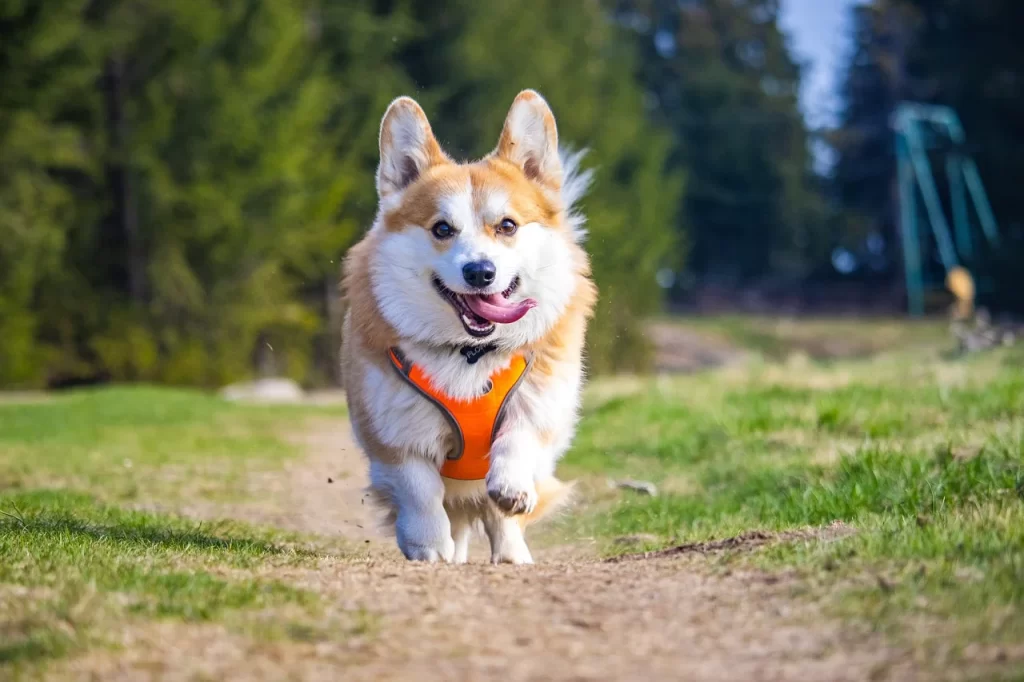
Corgis make great activity buddies in general but do they do well with high-impact activities, such as short and long-distance running?
Corgis do great with occasional sprinting and light jogging but they should not participate in long-distance running regularly. These dogs are at risk for joint and back problems, so high-impact exercise is hard for them. Running and walking on grass and ground is a good way to reduce the impact on their joints and make running more comfortable.
There are several great dog sports your corgi can try out but there are certainly limitations to keep in mind.
CORGI-SPECIFIC CONSIDERATIONS
Short Legs And Long Torso
Pembroke Welsh and Cardigan Welsh corgis have short legs and relatively long torsos due to a genetic mutation and subsequent selective breeding.
Corgis do not do well with any high-impact exercise due to their peculiar physique. High-impact activities include running.
Even if your dog is young and sprite and seems to do just fine with running and hopping, the hips and other joints do accumulate injury over time. Corgis are among the breeds that are especially prone to problems with joints later in life, with all the associated issues with mobility and pain.
Sensitivity To Hot Weather
A major factor and a safety concern for corgis is their relatively poor tolerance to hot weather. You should keep your corgi’s activity light on very warm days.
Corgis should participate in intense outdoor activities on days cooler than 70°F (21°C), ideally. Avoid running with your dog on hotter days.
Corgis have a thick double coat. Brushing it regularly helps with shedding old loose hairs to improve air circulation on the skin and keep them cooler on warm days.
Please read our post on corgis’ sensitivity to heat and how to keep your corgi cool in summer.
INDIVIDUAL DOG CHARACTERISTICS
Regardless of the dog’s breed, there are individual characteristics that affect a dog’s ability to participate in running.
The Dog’s Age
Your pet’s age is one of the most important individual factors.
Very young dogs – younger than one year old – should not run or participate in other high-impact activities. Their joints are still developing and are much more vulnerable to injury than joints of mature corgis. Puppies are very mobile and energetic, so there is always plenty of running around and jumping, which is fine. There is, however, no need to encourage any structured high-impact activity.
Old dogs, naturally, might not do well with intense exercise either, due to accumulating health problems and generally lower energy levels.
Weight
Corgis as a breed are also at risk for gaining excess weight, which is not healthy for any pet but is especially precarious for short-legged animals because of the additional stress exerted on their backs and joints.
Overall Level of Fitness and Health Status
A healthy animal that exercises regularly is more likely to tolerate intense exercise, whether it be hiking or sprinting, than a dog that is not appropriately conditioned.
Regular check-ups with a veterinarian, good nutrition, and a moderately active lifestyle will keep your corgi in good shape. Your pet’s healthy cardiovascular system will enable the dog to enjoy activities, as long as there are no problems with the joints, which could become a limiting factor.
It is important to increase the length and intensity of exercise gradually. Avoid starting with very ambitious goals for your dog, let your pup make progress gradually.
HOW TO MAKE RUNNING SAFER FOR YOUR CORGI
Screen Your Pet For Hip Dysplasia
Some tests allow for the detection of early changes even at about 4 months of age. Later the condition would become more apparent for a more definitive diagnosis. The recommendations could be different depending on the breed, so it is best to consult with a veterinarian about the issue.
If your dog has hip dysplasia, timely interventions help preserve your corgi’s mobility as well as possible.
As for running, the veterinarian will determine the range and intensity of activities that are safe for your dog, depending on the degree of joint abnormality. If the dog has dysplasia, pain often becomes another limiting factor. The right medication regimen and controlled physical activity help keep the pain under control.
Condition Your Dog
Avoid long and strenuous running trails at first. Start with a light jogging exercise or some sprinting if your corgi enjoys that. Help your dog build up strength and stamina and increase intensity as tolerated:
- If the dog looks energetic and happy afterward, then he or she does fine with the exercise.
- Looking a little tired is fine, as long as your animal is not utterly exhausted, which would be a signal to slow down.
- Heavy panting is a classic sign of fatigue and, possibly, dehydration or overheating.
As with most things, an individual dog may have characteristics that are not typical for the breed in general. You know your corgi best, and you should always evaluate how your pet responds to any new activity or changes.
Support Healthy Weight
Being active helps the dog stay in shape but if your pet is overweight, help the dog lose some weight by engaging in lighter activity before he/she can tolerate running.
Do your best to provide high-quality food for your pet and discourage overeating, which most household pets are prone to. In particular, many pet parents do not realize that treats can be very high in calories and low in nutrients.
Provide Plenty Of Water When Running
Always make sure your pup has access to plenty of clean water, especially when running or going on some other outdoor adventure.
Dogs often forget to hydrate, especially if it is really into a game or other activity outdoors. Bring along a water bottle for your pup and remind your furry friend to drink.
Choose The Right Surface To Run And Walk On
Compared to asphalt running trails, ground trails or grass are usually much more comfortable for dogs (and people) to run on for a couple of reasons:
- First, ground and grass absorb shock and are easier on the joints;
- Second, on hot or very cold days your dog’s paws will be much more comfortable on grass or ground than on asphalt. Those surfaces help prevent burns and frostbite.
You could also look into the options of either paw wax for dogs or dog booties to protect the paws from temperature extremes and injuries in general.
Walking is a great way to exercise for corgis, and walking on the right surface is also important for their joints and paws.
Avoid Running In Hot Weather
A major factor and a safety concern for corgis is their relatively poor tolerance to hot weather. Even on an idle hot day, you should keep your corgi’s activity light.
If you do take your pup for a jog or a hike, a day not warmer than 70°F (21°C) is a safer choice. A shaded trail is ideal and access to water and rest breaks is a must.
Corgis do have a thick double coat, so brushing it regularly will help get rid of old loose hairs to improve air circulation on the skin and keep them cooler on warm days.
Recent Posts
A peculiar characteristic that distinguishes corgis from other herding breeds is their short legs with a bowed appearance. Corgis have short legs due to a random mutation and, historically,...

